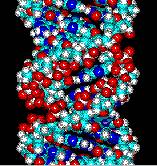AAD: Genetic Defect in Skin Barrier Tied to Eczema
A genetic defect in the skin's protective outer later that allows microbes, allergens and other irritants to penetrate the skin likely underlies atopic dermatitis and may contribute to the development of food allergies, according to research presented this week at the American Academy of Dermatology's 66th Annual Meeting in San Antonio, Texas.

MONDAY, Feb. 4 (HealthDay News) -- A genetic defect in the skin's protective outer later that allows microbes, allergens and other irritants to penetrate the skin likely underlies atopic dermatitis and may contribute to the development of food allergies, according to research presented this week at the American Academy of Dermatology's 66th Annual Meeting in San Antonio, Texas.
Jon M. Hanifin, M.D., of Oregon Health and Science University in Portland, Ore., discussed new data on the genetic basis of atopic dermatitis, the relationship to childhood allergies, and implications for the management of childhood eczema.
The researchers gained insights into atopic dermatitis by studying another genetic skin disease, ichthyosis vulgaris. In both conditions, mutations in the filaggrin gene, necessary for the integrity of the skin's outer barrier layer, lead to breaches in the epidermis. When food allergens pass through this defective skin barrier, very elevated levels of IgE antibodies and allergic reactions to food can result. Thus, in contrast to the common misconception that food allergies cause eczema, it is rather the broken skin barrier of eczema that leads to food allergies.
Hanifin comments on the implications of this research: "Strong evidence linking a broken skin barrier to the development of future allergies offers an important prevention opportunity. Babies with eczema need early therapy with measures directed at repair and maintenance of the skin's barrier."
More Information on Annual Meeting
Copyright © 2008 ScoutNews, LLC. All rights reserved.